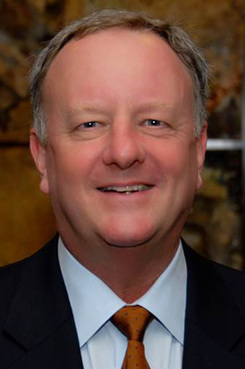Bayer Names Monsanto's Scott Partridge as General Counsel for US Operations
"There is much to do, with many opportunities ahead, and I look forward to rolling up my sleeves and working with the executive team to build the business,” Partridge said in a statement.
September 27, 2018 at 09:05 AM
4 minute read
 Scott Partridge. Courtesy photo.
Scott Partridge. Courtesy photo.
International life sciences giant Bayer AG announced Thursday that Monsanto Co. executive Scott Partridge is the new general counsel for its expanded U.S. operations.
Partridge, who was heading Bayer's strategy-competition policy team since June, replaces Jan Heinemann as general counsel, effective Oct. 1.
Germany-based Bayer acquired Monsanto in June after a two-year regulatory struggle. The $63 billion acquisition made Bayer—previously best known for its pharmaceuticals—the biggest seed and agricultural-chemicals maker in the world.
In a statement, Partridge said, “It is an honor to join the Bayer team as U.S. general counsel at this critical moment in the company's history. There is much to do, with many opportunities ahead, and I look forward to rolling up my sleeves and working with the executive team to build the business.” He was not immediately available for further comment.
At St. Louis-based Monsanto, Partridge served as the vice president for global strategy, overseeing global competition policy, coordinating strategic advocacy on critical issues and leading the company's dispute resolution activities. He previously served as Monsanto's chief deputy general counsel until the global strategy vice presidency was created for him in 2008, according to his bio.
The bio says after graduating from Tulane University School of Law, he worked 27 years in private practice—primarily in litigation, crisis management and dispute resolution. He also serves on the board of the International institute for Conflict Prevention & Resolution.
At Monsanto, Partridge designed the company's relationship-based dispute resolution and conflict avoidance model. The model was created for use with multinational competitors, but the core principles have been successfully applied to other contexts such as customer relationships, complex litigation and class actions.
The program puts businesspeople and scientists at the lead of strategic relationships with the responsibility to identify potential conflicts and explore opportunities to work together on future business ventures and new research collaborations. As a result, Monsanto no longer had any litigation with any competitor or major client.
In recognition of his unique work, the CPR honored Partridge and Monsanto in 2016 with its inaugural Inspiring Innovation Award.
His legal department will still have its hands full, though. It must help with the continued integration of Monsanto into Bayer's crop science division.
In addition, before the merger Monsanto's now-retired general counsel David Snively was engaged in battles on at least three major legal fronts.
First, a jury in August awarded $289 million to a school groundskeeper who claimed the herbicide Roundup gave him cancer. Some 9,000 other people have joined suits against Roundup.
Monsanto, and now Bayer, have said Roundup is safe and they have the scientific studies to prove it. They are appealing the jury verdict and defending the other suits.
On a second front, Monsanto also has been sued by at least 12 West Coast municipalities and states, plus Ohio, over the presence of PCBs—or polychlorinated biphenyl—in the environment. PCBs were man-made chemicals used in hundreds of industrial and commercial applications until they were banned in 1979. Monsanto produced most of the PCBs used in the U.S., according to the suits.
In April, in its last quarterly financial report to the U.S. Securities and Exchange Commission just prior to the merger, Monsanto said it was “defending lawsuits in various state and federal courts, in which approximately 5,200 plaintiffs claim to have been injured by exposure to glyphosate-based [PCB] products manufactured by the company. The majority of plaintiffs have brought actions in state courts in Missouri, Delaware and California, while the remainder of plaintiffs' cases were filed in many different federal courts.”
The report said all the federal cases were transferred in October 2016 to the Northern District of California. “The company believes that it has meritorious factual and legal defenses to these cases and is vigorously defending them,” the report noted.
In the third area of litigation, the report said legal actions have been filed in Brazil that raise various issues challenging the right to collect certain royalties for Monsanto's Roundup Ready soybeans. “These issues are currently under judicial review in Brazil. Monsanto believes it has meritorious legal arguments and will continue to represent its interests vigorously in these proceedings,” it stated.
This content has been archived. It is available through our partners, LexisNexis® and Bloomberg Law.
To view this content, please continue to their sites.
Not a Lexis Subscriber?
Subscribe Now
Not a Bloomberg Law Subscriber?
Subscribe Now
NOT FOR REPRINT
© 2025 ALM Global, LLC, All Rights Reserved. Request academic re-use from www.copyright.com. All other uses, submit a request to [email protected]. For more information visit Asset & Logo Licensing.
You Might Like
View All

'Climate-Smart Beef'?: DC Lawsuit Accuses Tyson Foods of False Advertising
3 minute read

SEC's Proposed Climate Disclosure Rule Draws Concern From Left-Leaning Senators
4 minute readTrending Stories
- 1'A Death Sentence for TikTok'?: Litigators and Experts Weigh Impact of Potential Ban on Creators and Data Privacy
- 2Bribery Case Against Former Lt. Gov. Brian Benjamin Is Dropped
- 3‘Extremely Disturbing’: AI Firms Face Class Action by ‘Taskers’ Exposed to Traumatic Content
- 4State Appeals Court Revives BraunHagey Lawsuit Alleging $4.2M Unlawful Wire to China
- 5Invoking Trump, AG Bonta Reminds Lawyers of Duties to Noncitizens in Plea Dealing
Who Got The Work
J. Brugh Lower of Gibbons has entered an appearance for industrial equipment supplier Devco Corporation in a pending trademark infringement lawsuit. The suit, accusing the defendant of selling knock-off Graco products, was filed Dec. 18 in New Jersey District Court by Rivkin Radler on behalf of Graco Inc. and Graco Minnesota. The case, assigned to U.S. District Judge Zahid N. Quraishi, is 3:24-cv-11294, Graco Inc. et al v. Devco Corporation.
Who Got The Work
Rebecca Maller-Stein and Kent A. Yalowitz of Arnold & Porter Kaye Scholer have entered their appearances for Hanaco Venture Capital and its executives, Lior Prosor and David Frankel, in a pending securities lawsuit. The action, filed on Dec. 24 in New York Southern District Court by Zell, Aron & Co. on behalf of Goldeneye Advisors, accuses the defendants of negligently and fraudulently managing the plaintiff's $1 million investment. The case, assigned to U.S. District Judge Vernon S. Broderick, is 1:24-cv-09918, Goldeneye Advisors, LLC v. Hanaco Venture Capital, Ltd. et al.
Who Got The Work
Attorneys from A&O Shearman has stepped in as defense counsel for Toronto-Dominion Bank and other defendants in a pending securities class action. The suit, filed Dec. 11 in New York Southern District Court by Bleichmar Fonti & Auld, accuses the defendants of concealing the bank's 'pervasive' deficiencies in regards to its compliance with the Bank Secrecy Act and the quality of its anti-money laundering controls. The case, assigned to U.S. District Judge Arun Subramanian, is 1:24-cv-09445, Gonzalez v. The Toronto-Dominion Bank et al.
Who Got The Work
Crown Castle International, a Pennsylvania company providing shared communications infrastructure, has turned to Luke D. Wolf of Gordon Rees Scully Mansukhani to fend off a pending breach-of-contract lawsuit. The court action, filed Nov. 25 in Michigan Eastern District Court by Hooper Hathaway PC on behalf of The Town Residences LLC, accuses Crown Castle of failing to transfer approximately $30,000 in utility payments from T-Mobile in breach of a roof-top lease and assignment agreement. The case, assigned to U.S. District Judge Susan K. Declercq, is 2:24-cv-13131, The Town Residences LLC v. T-Mobile US, Inc. et al.
Who Got The Work
Wilfred P. Coronato and Daniel M. Schwartz of McCarter & English have stepped in as defense counsel to Electrolux Home Products Inc. in a pending product liability lawsuit. The court action, filed Nov. 26 in New York Eastern District Court by Poulos Lopiccolo PC and Nagel Rice LLP on behalf of David Stern, alleges that the defendant's refrigerators’ drawers and shelving repeatedly break and fall apart within months after purchase. The case, assigned to U.S. District Judge Joan M. Azrack, is 2:24-cv-08204, Stern v. Electrolux Home Products, Inc.
Featured Firms
Law Offices of Gary Martin Hays & Associates, P.C.
(470) 294-1674
Law Offices of Mark E. Salomone
(857) 444-6468
Smith & Hassler
(713) 739-1250






